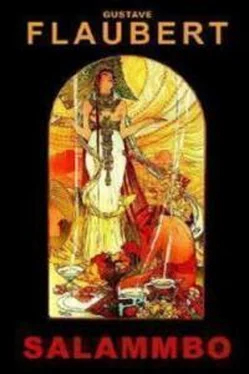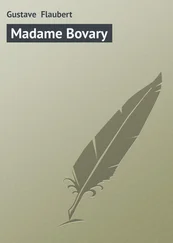The Carthaginians, however, who were consumed by thirst, had rushed to the cisterns. They broke open the doors. A miry swamp stretched at the bottom.
What was to be done now? Moreover, the Barbarians were countless, and when their fatigue was over they would begin again.
The people deliberated all night in groups at the corners of the streets. Some said that they ought to send away the women, the sick, and the old men; others proposed to abandon the town, and found a colony far away. But vessels were lacking, and when the sun appeared no decision had been made.
There was no fighting that day, all being too much exhausted. The sleepers looked like corpses.
Then the Carthaginians, reflecting upon the cause of their disasters, remembered that they had not dispatched to Phoenicia the annual offering due to Tyrian Melkarth, and a great terror came upon them. The gods were indignant with the Republic, and were, no doubt, about to prosecute their vengeance.
They were considered as cruel masters, who were appeased with supplications and allowed themselves to be bribed with presents. All were feeble in comparison with Moloch the Devourer. The existence, the very flesh of men, belonged to him; and hence in order to preserve it, the Carthaginians used to offer up a portion of it to him, which calmed his fury. Children were burned on the forehead, or on the nape of the neck, with woollen wicks; and as this mode of satisfying Baal brought in much money to the priests, they failed not to recommend it as being easier and more pleasant.
This time, however, the Republic itself was at stake. But as every profit must be purchased by some loss, and as every transaction was regulated according to the needs of the weaker and the demands of the stronger, there was no pain great enough for the god, since he delighted in such as was of the most horrible description, and all were now at his mercy. He must accordingly be fully gratified. Precedents showed that in this way the scourge would be made to disappear. Moreover, it was believed that an immolation by fire would purify Carthage. The ferocity of the people was predisposed towards it. The choice, too, must fall exclusively upon the families of the great.
The Ancients assembled. The sitting was a long one. Hanno had come to it. As he was now unable to sit he remained lying down near the door, half hidden among the fringes of the lofty tapestry; and when the pontiff of Moloch asked them whether they would consent to surrender their children, his voice suddenly broke forth from the shadow like the roaring of a genius in the depths of a cavern. He regretted, he said, that he had none of his own blood to give; and he gazed at Hamilcar, who faced him at the other end of the hall. The Suffet was so much disconcerted by this look that it made him lower his eyes. All successively bent their heads in approval; and in accordance with the rites he had to reply to the high priest: "Yes; be it so." Then the Ancients decreed the sacrifice in traditional circumlocution,—because there are things more troublesome to say than to perform.
The decision was almost immediately known in Carthage, and lamentations resounded. The cries of women might everywhere be heard; their husbands consoled them, or railed at them with remonstrances.
But three hours afterwards extraordinary tidings were spread abroad: the Suffet had discovered springs at the foot of the cliff. There was a rush to the place. Water might be seen in holes dug in the sand, and some were already lying flat on the ground and drinking.
Hamilcar did not himself know whether it was by the determination of the gods or through the vague recollection of a revelation which his father had once made to him; but on leaving the Ancients he had gone down to the shore and had begun to dig the gravel with his slaves.
He gave clothing, boots, and wine. He gave all the rest of the corn that he was keeping by him. He even let the crowd enter his palace, and he opened kitchens, stores, and all the rooms,—Salammbo's alone excepted. He announced that six thousand Gaulish Mercenaries were coming, and that the king of Macedonia was sending soldiers.
But on the second day the springs diminished, and on the evening of the third they were completely dried up. Then the decree of the Ancients passed everywhere from lip to lip, and the priests of Moloch began their task.
Men in black robes presented themselves in the houses. In many instances the owners had deserted them under pretence of some business, or of some dainty that they were going to buy; and the servants of Moloch came and took the children away. Others themselves surrendered them stupidly. Then they were brought to the temple of Tanith, where the priestesses were charged with their amusement and support until the solemn day.
They visited Hamilcar suddenly and found him in his gardens.
"Barca! we come for that that you know of—your son!" They added that some people had met him one evening during the previous moon in the centre of the Mappalian district being led by an old man.
He was as though suffocated at first. But speedily understanding that any denial would be in vain, Hamilcar bowed; and he brought them into the commercial house. Some slaves who had run up at a sign kept watch all round about it.
He entered Salammbo's room in a state of distraction. He seized Hannibal with one hand, snatched up the cord of a trailing garment with the other, tied his feet and hands with it, thrust the end into his mouth to form a gag, and hid him under the bed of the ox–hides by letting an ample drapery fall to the ground.
Afterwards he walked about from right to left, raised his arms, wheeled round, bit his lips. Then he stood still with staring eyelids, and panted as though he were about to die.
But he clapped his hands three times. Giddenem appeared.
"Listen!" he said, "go and take from among the slaves a male child from eight to nine years of age, with black hair and swelling forehead! Bring him here! make haste!"
Giddenem soon entered again, bringing forward a young boy.
He was a miserable child, at once lean and bloated; his skin looked greyish, like the infected rag hanging to his sides; his head was sunk between his shoulders, and with the back of his hand he was rubbing his eyes, which were filled with flies.
How could he ever be confounded with Hannibal! and there was no time to choose another. Hamilcar looked at Giddenem; he felt inclined to strangle him.
"Begone!" he cried; and the master of the slaves fled.
The misfortune which he had so long dreaded was therefore come, and with extravagant efforts he strove to discover whether there was not some mode, some means to escape it.
Abdalonim suddenly spoke from behind the door. The Suffet was being asked for. The servants of Moloch were growing impatient.
Hamilcar repressed a cry as though a red hot iron had burnt him; and he began anew to pace the room like one distraught. Then he sank down beside the balustrade, and, with his elbows on his knees, pressed his forehead into his shut fists.
The porphyry basin still contained a little clear water for Salammbo's ablutions. In spite of his repugnance and all his pride, the Suffet dipped the child into it, and, like a slave merchant, began to wash him and rub him with strigils and red earth. Then he took two purple squares from the receptacles round the wall, placed one on his breast and the other on his back, and joined them together on the collar bones with two diamond clasps. He poured perfume upon his head, passed an electrum necklace around his neck, and put on him sandals with heels of pearl,—sandals belonging to his own daughter! But he stamped with shame and vexation; Salammbo, who busied herself in helping him, was as pale as he. The child, dazzled by such splendour, smiled and, growing bold even, was beginning to clap his hands and jump, when Hamilcar took him away.
Читать дальше









![Гюстав Флобер - Закат Карфагена [Сборник]](/books/414440/gyustav-flober-zakat-karfagena-sbornik-thumb.webp)
